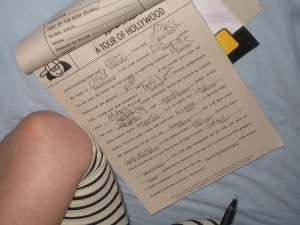[Note: This post refers to the old SAT]
Do you all remember Mad Libs? You make up nouns, verb and adjectives to add to a paragraph of text. Then you read the resulting paragraph and general hilarity ensues. We loved them as kids and my daughter loves them now.
Some of my students approach the vocab questions in the SAT Critical Reading section the exact same way.
Give me a word, any word
So, for example, they’ll read the sentence up to the blank:
“The cafe attracts a __ clientele:..”
They realize they are looking for an adjective. So they grab the next adjective they can think of – usually by looking at the answer choices and seeing if they recognize a word that might work.
Here’s how a recent student justified choosing “mysterious” as the answer:
I went to a cafe with my cousin and everyone looked weird, so I thought mysterious would be a good choice.
Give me a very, very specific word
But the SAT isn’t testing if you can choose a *random* adjective. They are looking for a very specific adjective – what word is the perfect fit in this particular sentence?
For starters, you need to read the whole sentence to get the context.
“The cafe attracts a __ clientele: a startlingly hetergeneous group of people collects here.”
Ah – now we can get a sense of what that blank needs to mean.
Do you see that the words after the colon are pointing to the meaning of the blank? The word that fits in the blank needs to mean “a startlingly heterogenerous group”
Hmmm…heterogeneous. I know that “homo” means the same, so a good guess is that “hetero” means different. So a different group – what about “diverse?” The means really different. So the right answer has to be a word that means different.
1. Read the whole sentence and figure out the meaning of the blank
Only a word that matches the meaning of the blank will work. What key words in the sentence are pointing to the meaning of the blank?
Here’s another example.
“The bower bird is known for its _______; it collects shiny things to add its nest.”
“It collects”
So the bird collects stuff and is known for doing so. Therefore only word that will fit into the blank has to mean ‘collecting things.” There are a number of words that could work – hoarding, gathering, collecting, acquisition, stealing.
2. Write that word into the blank
As always, you want to minimize the load on your short term memory. It’s also easier to quickly write in a word into the blank that to try and remember it while considering the meaning of 5 other closely-related words.
Write “collecting” into the blank.
3. Now look at the answer choices to see what matches your word
Now you’re ready to look at the answer choices to see which word matches the meaning of “collecting.”
Go through them one by one, crossing out the words that don’t match the meaning you are looking for.
This is how I teach my students to tackle the SAT – solve the problem before looking at the answer choices. It’s similar to the reading passages strategy of identifying the cupcake you are looking for ahead of time. And similar to the fact that the answer choices are practically irrelevant.
Photo credit: goldberg at Flickr
